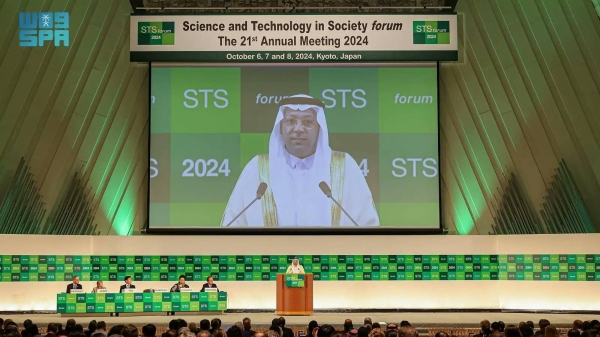Saudi Arabia is focusing on science and technology as key drivers in achieving sustainability and addressing global challenges such as climate change, food security, health crises, and advances in artificial intelligence. Dr. Munir Al-Dasouki, President of King Abdulaziz City for Science and Technology (KACST), emphasized this during his speech at the Science and Technology in Society (STS) Forum in Kyoto. The country aims to produce 600 tons of green hydrogen by 2026 and has launched initiatives to combat dengue fever and preserve groundwater resources using environmentally friendly technologies.
As part of its commitment to global sustainability, Saudi Arabia has developed renewable energy technologies, including the largest carbon capture and storage centers in the world. By 2027, the country plans to capture 9 million tons of carbon dioxide annually, expanding to 44 million tons by 2035. This will contribute significantly to reducing greenhouse gas emissions and combating climate change.
In the area of public health, KACST has partnered with others to develop solutions for combating dengue fever and reducing infection rates by 70% by 2027. These initiatives use environmentally friendly biological control techniques to minimize the impact on the environment. Additionally, Saudi Arabia has established a platform utilizing space application technologies to monitor the Earth and agricultural activities, leading to savings of 9 billion cubic meters of groundwater by 70% by 2027.
To support innovation and entrepreneurship, Saudi Arabia has invested heavily in nurturing young scientists, researchers, and innovators. KACST has launched initiatives in Web 3 applications such as immersive technologies, electronic games, and augmented reality to equip them with the skills necessary for digital transformation and economic diversification. The country has also established a business incubator and accelerator called the “Garage” to support emerging companies in deep technologies, promoting growth and bridging the gap from the laboratory to the market.
Dr. Al-Dasouki invited leaders in research, development, and innovation to visit Riyadh Expo 2030, focusing on science and technology under the theme “A Different Tomorrow.” This event will showcase future innovations aimed at creating a sustainable and prosperous world for future generations. The STS Forum in Kyoto provided a platform for discussions on various topics including research and development, enhancing innovation, cybersecurity, renewable energy, healthcare, and digital transformation. By emphasizing the importance of science and technology, Saudi Arabia is positioning itself as a leader in global sustainability efforts and technological advancements.











